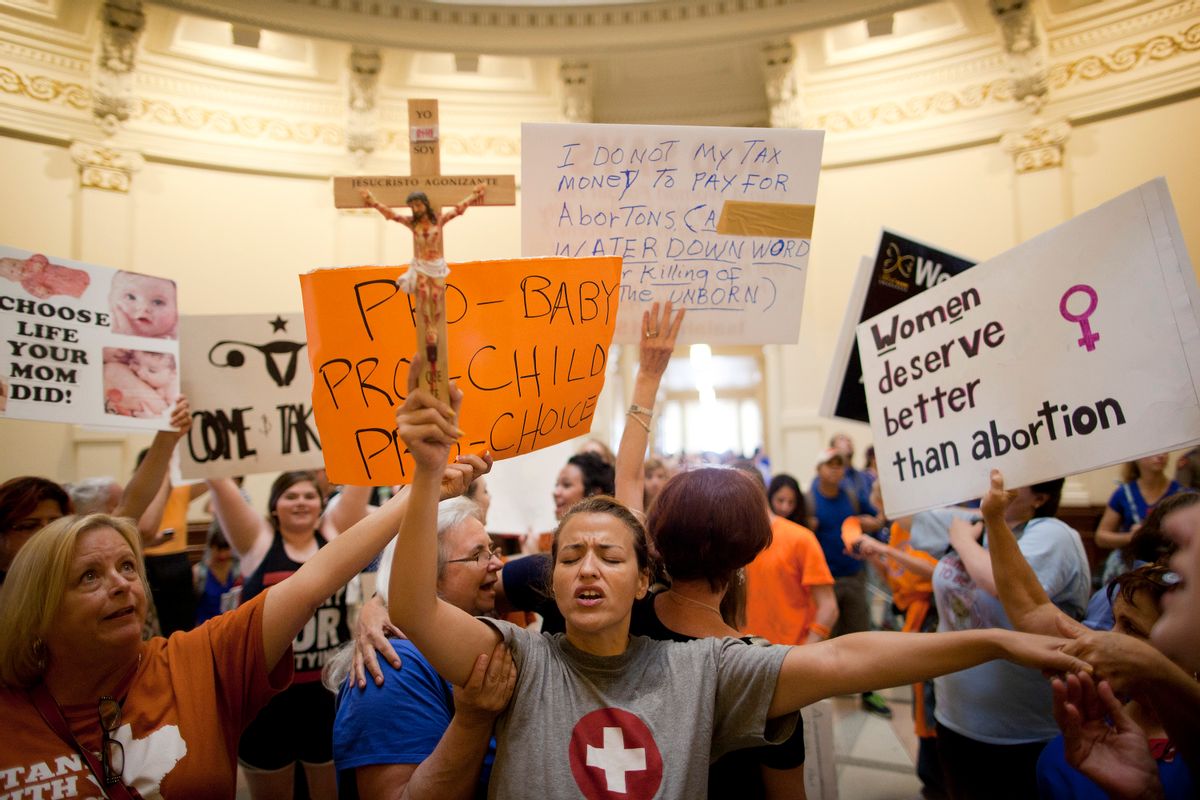In less than a month, as the remaining provision of Texas' sweeping new abortion law goes into effect, abortion providers will have to meet the standards of ambulatory surgical centers in order to remain open. The new requirement threatens to shutter all but six of the remaining providers in the state, but legislators who support HB 2 argue the clinic standards are about the safety of the procedure, not dramatically scaling back abortion access in Texas. Melissa Conway, spokesperson for Texas Right to Life, told the Texas Tribune that, "Abortionists continue to promote and justify the right to perform the life-ending procedure of abortion while forcing women to be subjected to substandard and potentially dangerous clinic environments."
But the requirement, back in court on Monday, has been widely criticized by major medical associations as having no bearing on the safety of an already very safe procedure. Less than 0.5 percent of abortions involve major complications, and organizations like the American Congress of Obstetricians and Gynecologists oppose the new law for singling out abortion providers with "regulations that are more stringent for abortion than for other surgical procedures of similar low risk." Under the new law, arbitrary measures like the availability of lockers and the size of parking lots will decide whether or not an already-licensed facility can continue to operate.
So the question before the court is, once again, whether this requirement presents an undue burden for Texans seeking abortion care. Will having fewer than 10 abortion providers in the second most populous state in the nation present a legitimate threat to Texans' constitutional right to abortion?
There were 41 abortion providers in the state in 2013. In the wake of HB 2, that number has fallen to 19. Researchers at the Texas Policy Evaluation Project found that, as a result of the new law, the number of women of reproductive age living more than 200 miles from a provider has increased by nearly 3,000 percent -- from 10,000 women in 2013 to 290,000 in 2014. If and when the ambulatory surgical center requirements kick in, that number is expected to balloon to nearly 800,000.
But in an earlier legal challenge to an admitting privileges requirement of the new law, a panel of judges from the 5th Circuit Court of Appeals found that requiring a person seeking abortion care to drive hundreds of miles over multiple days -- thanks to mandatory waiting periods and counseling laws -- did not present an undue burden. Judge Edith Jones of that court instructed people facing a 300-mile round trip to the nearest provider to simply drive fast. “Do you know how long that takes in Texas at 75 miles an hour? This is a peculiarly flat and not congested highway,” she said.
So just to keep the tally straight about undue burdens versus not-undue burdens: If you are a working mother in Texas who has to drive 300 miles round trip, take multiple days off work and secure childcare all in the service of accessing basic medical care that is nominally protected under the United States Constitution, you are not up against an undue burden, according to a panel of 5th Circuit judges. But if you are a closely held corporation that believes including coverage for emergency contraception in an employer health plan is a violation of your religious exercise, you are definitely facing an undue burden, according to the Supreme Court. Got it? Got it. (In some positive news, courts have recently struck down laws similar to Texas' HB 2 in Mississippi and Alabama.)
Where other legal challenges -- namely, to the provision of HB 2 requiring clinics to have admitting privileges at hospitals within 30 miles -- have failed, lawyers representing providers across the state say they are optimistic about this case. “This is a little different, because we’re talking about building facilities that cost millions of dollars. Either they already exist, or they’re not going to magically appear on Sept. 1,” Esha Bhandari, an attorney for the Center for Reproductive Rights, told the Tribune.
Basically, whereas the harm done by HB 2 may have been hypothetical before, the consequences of the new law -- the number of clinics that have closed, the number of people living hundreds of miles from clinics, the cost burden that will hit low-income people in rural areas particularly hard -- have all become dangerously real in recent months.
The hearing is expected to go through Thursday, and a ruling is expected by the end of the month.



Shares